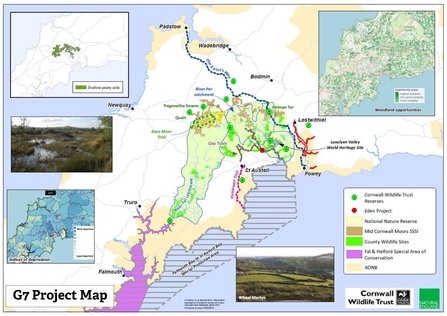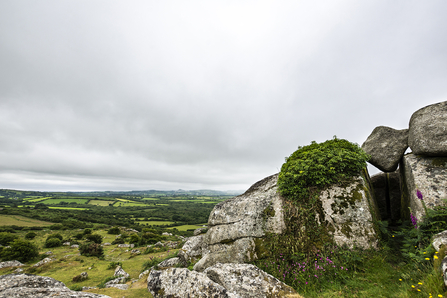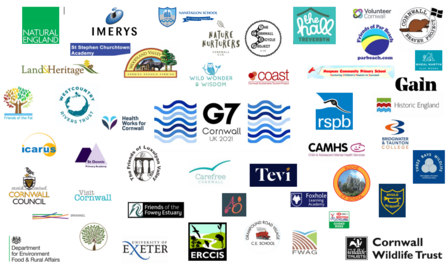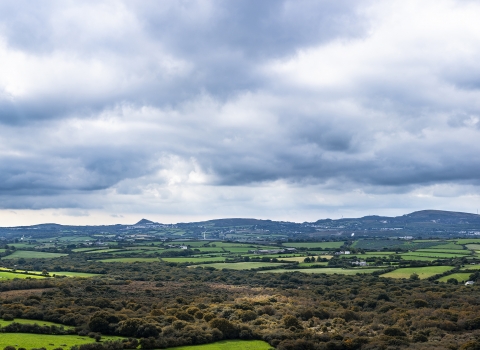What is the G7 Legacy Project for Nature Recovery?
The G7 Legacy Project for Nature Recovery (G7LPNR) is an ambitious project in mid-Cornwall assisting nature recovery in Cornwall, delivering outcomes for nature, for climate and for people. Cornwall Wildlife Trust and Natural England run the project in partnership and the project knits together and restores land and habitats for key species like dormice, marsh fritillary butterflies and willow tits. It is also improves access to nature for people’s wellbeing, improves water quality, sequesters carbon and employs skilled staff and apprentices to work with local people and communities. The pilot year was a great success delivering across 26 different projects between the Fal Estuary and Luxulyan Valley.
The G7 LPNR area forms part of an England wide nature recovery network, a national network of wildlife-rich places which the government has committed to creating in its 25-year Environment Plan.
Find out more about nature recovery networks by watching our video below:
Visit the Nature Recovery Network webpage
Where is the project today?
Since the Prime Minister announced the project’s funding at the G7 summit in June 2021, the project has made significant progress and after a successful pilot year, we are now into the second year. The project team (who you can get in touch with in our 'Find out more' section below) have been supporting projects across the G7 LPNR area and you can see a summary of the work undertaken from year one below.
We are excited to see what year two holds and what the project can deliver for people, for nature and for climate!

What are the project’s aims?
The G7 Legacy Project for Nature Recovery (G7 LPNR) is creating new nature rich places and restoring protected sites, species and landscape quality in the mid-Cornwall area.
This includes connecting nature reserves, such as Goss Moor National Nature Reserve and a suite of Cornwall Wildlife Trust reserves, to Sites of Special Scientific Interest (SSSIs), the Cornwall Area of Outstanding Natural Beauty (AONB), the Cornwall Mining World Heritage Sites, the coast and the Fal estuary and across the china clay pits to the World Heritage Site at Luxulyan Valley.
The project – over five years – will deliver for nature, for climate and for people, and will contribute to the UK’s target to legally protect and improve 30% of land for nature by 2030.
Natural England, Cornwall Wildlife Trust and Defra in partnership are enabling G7 LPNR to deliver a lasting legacy for nature and people by:
-
Restoring land through nature recovery and recreating scarce habitats through sustainable farming. Natural regeneration will be used to create scrub and woodland communities; scarce habitats such as heathland and wetland will be created, as well as the development of meadows and pasture, and the restoration of peat mires in the River Fal headwaters.
-
Providing opportunities to reintroduce lost species and improving resilience for key species including dormice, marsh fritillary butterflies, and willow tit.
-
Sequestrating approximately 440,000 tonnes of CO₂ through forest growth and wetland restoration, including peat habitats, improved soil condition and the recovery of marine blue carbon habitats.
-
Improving water quality, encouraging fish diversity and abundance, and reducing flood peaks to reduce downstream flooding.
-
Improving access to green space and green social prescribing so people across the county can enjoy the wellbeing benefits of contact with nature.
-
To enable transformation at this scale, the programme will employ skilled staff, develop a green jobs apprenticeship scheme and involve extensive community engagement to kickstart the development of nature’s recovery in Cornwall.
We hope that the project will act as a major driver for future green prosperity in Cornwall through green jobs, sustainable tourism and farming, and be a significant contribution to the national Nature Recovery Network as set out in the Environment Bill.
With additional investment and strong environmental laws and protection, Cornwall Wildlife Trust and partners can help deliver bigger, better managed and more joined-up wildlife habitats for nature to thrive.Chief Executive of Cornwall Wildlife Trust

Helman Tor / Cornwall Wildlife Trust / Ben Watkins
What happened in the first year?
The pilot year of the project saw great success against the projects main aims and has delivered:
-
For nature: 185.65Ha private and public land managed for nature recovery and restoration following nature recovery and regenerative principles, including a 794.7Ha increase of land for sustainable grazing, including establishment of beaver populations in two catchments and improving resilience of key species.
-
For climate: increased opportunities for carbon sequestration through new woodland, improved soil health and improved wetland condition.
-
For people: green skills development and careers for young people in an area of deprivation; support for rural businesses and the farming sector to develop and expand in a time of economic uncertainty; new health and wellbeing opportunities to access green space and 5.59Km of trail improvement. Additionally, support of local action for nature through social prescription, community events and volunteering.

G7 Year 1 Achievements
Below is a summary of the projects we supported during the pilot stage of the G7 LPNR. Click each image to find out more!
Alongside the funded projects, the G7 LPNR supported many other organisations across the project area. Get in touch to see if we can support your work!

Find out more
The G7LPNR team would love to hear from you to discuss the work of the project
I’m a farmer or landowner
The G7LPNR project is able to deliver farm plans and land management reports free of charge to farmers in the G7 catchment area. These will be created using a whole farm approach, including integrated natural capital, soil, water and business advise. The project’s farm advisors will be helping farmer's identify opportunities for nature on their farms.
If you’re interested in learning how the G7LPNR project can support you, please get in touch with our Programme Manager, Colin, at colin.pringle@cornwallwildlifetrust.org.uk.
I want to volunteer
The project’s Volunteer Engagement Officer Mat is leading on a wider variety of volunteering opportunities for local people to take part in. These roles will be readily available, accessible and rewarding to volunteers that will ultimately benefit nature and it’s recovery.
If you’re interested in volunteering for the G7LPNR project, please get in touch with our Volunteer Engagement Officer, Mat, at mat.bateman@cornwallwildlifetrust.org.uk.
I’m part of a community group
The G7LPNR project aims to connect more people to nature, getting them excited about what their local area has to offer alongside creating opportunities for them to be involved in nature recovery. The project will also support green social prescribing efforts across the project area, tapping into the fantastic benefits that time in nature can have on improving wellbeing.
If you’re a local community group, business or active in social prescription within the project’s catchment area, our Community Engagement Officer, Amy, would love to hear from you. Please get in touch at amy.gosney@cornwallwildlifetrust.org.uk.
The G7 project will be delivering from April 2022
The G7 nature recovery programme is a new Defra project for 2022 – 2025 which will follow the successful pilot year of delivery in 2021/22. The project aims to use nature recovery to deliver outcomes for nature, climate, and people in Cornwall. The programme was launched at the G7 in Cornwall and is delivered through Natural England as the accountable body and Cornwall Wildlife Trust as the Lead Delivery Partner.
Need for intervention
The global biosphere is rapidly approaching a planetary tipping point; climate change and biodiversity loss present one of the most severe tests to global resilience and the global community is immersed in three interlinked crises –of health, of climate and of nature. Nature and its vital ecosystem services are deteriorating worldwide; 14 out of 18 indicators showing the contribution of nature have declined. With half of the world’s GDP moderately or highly dependent on nature, biodiversity loss presents an issue for equality.
The UK is one of the most nature-depleted countries in the world; the climate crisis is already playing havoc with Britain’s weather systems with some of the hottest and driest summers and wettest winters on record, occurring in the last decade; and many in our communities suffer from a lack of exercise and connection to nature driving obesity, diabetes and poor mental health. There is strong evidence that access to nature improves health and wellbeing..
There is an urgent need for large-scale ambition here in the UK to address these climate, biodiversity, and health crises. World Leaders gathered in beautiful Cornwall for the G7 summit in June 2021 and we want to capitalise on that significant moment of international action by implementing a programme that harnesses nature recovery and creating a landscape of forest, heaths, wetlands meadows and coast arcing across central Cornwall from the Fal estuary across the china-clay pits to the World Heritage industrial sites and the Cornwall AONB.
The programme will bring together decades of public and private investment into the area, much of which is a post working landscape, showcasing how the Defra 25 YEP is delivering real environmental, social, and economic progress in a local area.
















